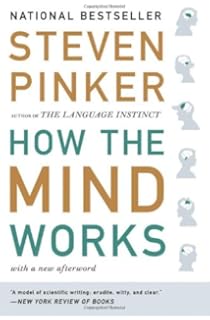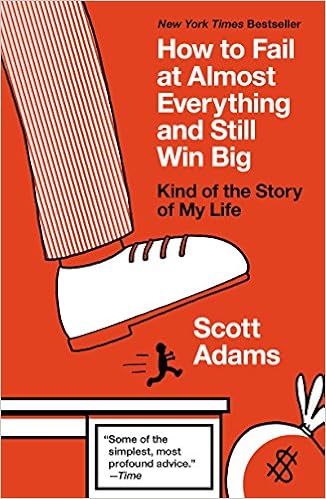The weirdest thing happened today. I was looking for an address on my street, because I wanted to fix a delivery error of somebody's else letter. The address had my unit number, but wrong building or complex number. I asked Siri: "Show me 422 Pine Ridge Road". Siri understood that as "Show me porn", and replied, something like "I don't know how to respond to that".
A few minutes later I get a call with no caller ID. I answer, and a woman's voice starts telling me in a sweet voice "I have been waiting for you..." I disconnected. What was that? Did a sex worker or brothel (they are legal in Queensland) buy my Siri query? I never got a call like that one before, and the timing looked like it was no coincidence.
Apple, what are you doing with people's Siri conversations?
Saturday, July 23, 2016
Sunday, July 3, 2016
How The Mind Works by Steven Pinker
A good book. Sometimes a bit too wordy. Sometimes a bit off topic. Nevertheless, very interesting. It's not just about the mind. It is about evolution, genes, neural networks, optics, and mathematics of music. It is about reverse-engineering us. Why we act the way we act. How our senses work.
To understand sight, we have to look to optics and computer vision systems. To understand movement, we have to look to robotics. To understand sexual and familial feeling, we have to look to Mendelian genetics. To understand cooperation and conflict, we have to look to the mathematics of games and to economic modeling.
Reverse engineering is the key to understanding how we work. Take morning sickness for example. Why is it part of pregnancy? A biologist, Margie Profet assumed that if it is there, it must be beneficial in some way, and she found it:
- Pregnancy sickness protects the developing baby from toxins: plant toxins in quantities that adults tolerate can cause birth defects
- Pregnancy sickness starts when the embryo is most vulnerable to teratogens (birth defect inducing chemicals)
- Pregnancy sickness ends when the embryo is past the critical stage of organ development and needs nutrients for further growth
- Women with more severe pregnancy sickness are less likely to miscarry
Confucius said "A common man marvels at uncommon things; a wise man marvels at the commonplace."
Steve Pinker is looking at commonplace human acts and wonders how they work, how could a robot do them.
Two related, interesting texts:
DNA seen through the eyes of a coder
The math equation for universal AI
The latter one is especially important. It may be describing how our intelligence works.
The latter one is especially important. It may be describing how our intelligence works.
New observations allow AIXI to improve its world model, which over time gets better and better. This is the learning component. [...]
The goal of AIXI is to maximise its reward over its lifetime – that’s the planning part. [...]
[...] every interaction cycle consists of observation, learning, prediction, planning, decision, action and reward, followed by the next cycle.
Saturday, July 2, 2016
How to Fail at Almost Everything and Still Win Big by Scott Adams
The full title includes: "Kind of the Story of My Life". Published in 2013.
Scott's recipe for happiness, condensed:
Healthy diet -> Energy -> Exercise -> More energy -> Learn new skills -> Flexible schedule
"Goals are for losers and systems are for winners"
Forcing yourself to do something, for example to eat right, or to exercise, takes a lot of willpower. The trick is to set up yourself and your environment, so the things that you want to achieve come without effort. How to do that? For eating: you could stack your fridge with healthy foods, use spices to make them taste great. For exercise: you need a routine - exercise must be done every day and must be pleasant. You should not overdo it the first day, and then be in pain for a few days.
I grew up in an environment that was setup for more healthy living:
Scott's recipe for happiness, condensed:
Healthy diet -> Energy -> Exercise -> More energy -> Learn new skills -> Flexible schedule
"Goals are for losers and systems are for winners"
Forcing yourself to do something, for example to eat right, or to exercise, takes a lot of willpower. The trick is to set up yourself and your environment, so the things that you want to achieve come without effort. How to do that? For eating: you could stack your fridge with healthy foods, use spices to make them taste great. For exercise: you need a routine - exercise must be done every day and must be pleasant. You should not overdo it the first day, and then be in pain for a few days.
I grew up in an environment that was setup for more healthy living:
- The pantry with the best food (sweets, sausages) was locked. My snacks were carrots and apples.
- I walked to school, shops, church. I took a train when going farther away.
- I played with other kids in the streets, in a park, and on school grounds.
Polish Proverbs - Part Three
1. Starych drzew się nie przesadza. Old trees are not to be replanted. Old people should not be uprooted. They should live out their days in a familiar environment.
2. Cicha woda brzegi rwie. Quiet water rips the banks (of a river). The quiet ones are sometimes the most adventurous.
3. Podróże kształcą. Journeys educate.
4. Cudze chwalicie, swego nie znacie. You are praising others' (things or customs), you don't know yours'. You are praising foreign things, and you are unaware of your country's achievements.
5. Potrzeba matką wynalazku. A need is a mother of invention.
6. Głodnemu chleb na myśli. A hungry person's thoughts are about bread.
7. Lepiej późno niż wcale. Better late than never.
8. Pan Bóg nie rychliwy, ale sprawiedliwy. God is not quick, but fair/just. Similar to "You reap, what you sow".
9. Przyganiał kocioł garnkowi. The cauldron critiqued the pot. I understood it about the big one criticising the small one, while doing the same thing. It seems that it is not about the size, but about getting dirty. The full version of the saying is "Przyganiał kocioł garnkowi, a sam smoli" - the cauldron critiqued the pot, but it is sooting too.
10. W gorącej wodzie kąpany. He who had a bath in hot (too hot) water. A quicksilver. Somebody who is quick to react, usually overreact, do something without thinking it trough.
11. Czego oczy nie widzą, tego sercu nie żal. What the eyes don't see, the heart does not regret. Sometimes it is better not to see or know about something.
See also: Polish Proverbs - Part One, Polish Proverbs - Part Two
2. Cicha woda brzegi rwie. Quiet water rips the banks (of a river). The quiet ones are sometimes the most adventurous.
3. Podróże kształcą. Journeys educate.
4. Cudze chwalicie, swego nie znacie. You are praising others' (things or customs), you don't know yours'. You are praising foreign things, and you are unaware of your country's achievements.
5. Potrzeba matką wynalazku. A need is a mother of invention.
6. Głodnemu chleb na myśli. A hungry person's thoughts are about bread.
7. Lepiej późno niż wcale. Better late than never.
8. Pan Bóg nie rychliwy, ale sprawiedliwy. God is not quick, but fair/just. Similar to "You reap, what you sow".
9. Przyganiał kocioł garnkowi. The cauldron critiqued the pot. I understood it about the big one criticising the small one, while doing the same thing. It seems that it is not about the size, but about getting dirty. The full version of the saying is "Przyganiał kocioł garnkowi, a sam smoli" - the cauldron critiqued the pot, but it is sooting too.
10. W gorącej wodzie kąpany. He who had a bath in hot (too hot) water. A quicksilver. Somebody who is quick to react, usually overreact, do something without thinking it trough.
11. Czego oczy nie widzą, tego sercu nie żal. What the eyes don't see, the heart does not regret. Sometimes it is better not to see or know about something.
See also: Polish Proverbs - Part One, Polish Proverbs - Part Two

